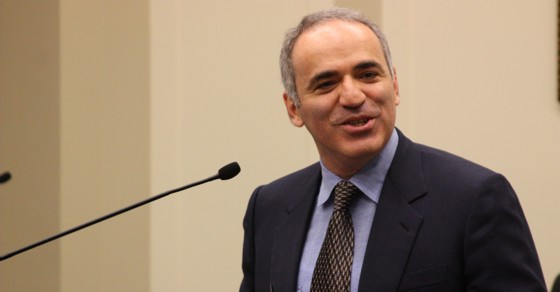
As a libertarian and former chess prodigy, I enjoyed very much an address by Gary Kasparov at the Cato Institute entitled, “The Influence of American Values.” Here are some of the highlights of his talk:
Like probably half the people in this room, I’m currently working on a book project I never have time to finish. Its central theme is the shift in American values over the past four decades. Ronald Reagan’s shining beacon on a hill of my Soviet youth has moved away from the freedom agenda, both domestically and internationally. The traditional American values of liberty, sacrifice, risk-taking, and even faith have declined. On the rise are safety over risk, equality over excellence, comfort over sacrifice, and hyper-partisanship that fights harder and harder for smaller pieces of a smaller pie.
The working title of my manuscript is a little shocking to some: Un-American. …
It is no coincidence that this rise of un-American values has been accompanied by a rise in global criticism of the United States and the system that made it so successful.
By “system” I do not mean democracy, although the rise of China and the arrogance of dictators like Putin and Assad has allowed the superiority of democracy to be questioned. An even more dangerous delusion is the increasing attack on the free market concept itself, an attack on the principles of capitalism that have created our unprecedented standard of living. …
I’m afraid my memory is not photographic as some of the legends about me say, but I am sure I would remember if the works of Adam Smith included the phrase, “too big to fail.” When the state steps in, deciding which companies live or die, things have gone terribly wrong. If a bankrupt small business in South Carolina can go belly up, so must General Motors, so must Goldman Sachs. Much of the conservative conversation about the government is about making it smaller. But size isn’t everything. A small government can still be dangerously interventionist. Limiting the government’s power should come before worrying about its size.
When you base your policies on principles there is no room for “but.” “We believe in the free market but . . . “ That’s trouble. Rising inequality is a critical problem today, and it comes from decades of moving away from the principles of excellence that had created the richest society in history by the end of the 1960s.Trying to repair the damage of nearly two generations of value shift with policies that attempt to enforce equality will only make things worse. Trust me, I am from a place where everyone was supposed to be equal, or else, and it wasn’t as nice as some of today’s liberal commentators seem to think it would be. …
For the government to get out of the way, the people have to demand it. Aiming high, believing in yourself and the power of your desires to change the world is an essential part of citizenship in a democracy, especially the greatest one of all. The best way for America to thrive and to lead is for it to once again serve as a model of how successful a nation can be when the government stays out of the dreams of its people.
Photo used here under Flickr Creative Commons.